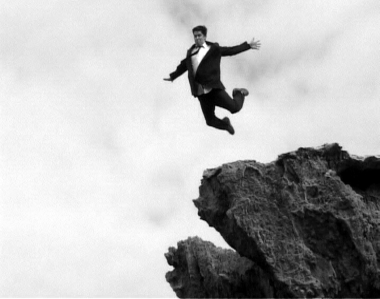Most people, of course, avoid failure. Or, at least, they try to, as much as possible. Or, even worse, they deny having failed and push on steadily against increasing odds just to show ‘em they mean business. What good comes of that? What lessons has success ever taught?
Pick a skill, any skill: let’s say, tightrope walking. Imagine the first time you approach the cable stretched taught out in front of you, you close your eyes, stick out your hands, and walk to the other side. The next time, same thing. And the next. You are, it seems, amazingly gifted at walking across thin cables suspended high above the ground. How’s that make you feel? Have you learned anything? Should I admire you? Do you even admire yourself? Or are you bored, having found tight-rope walking to be as easy (easier, in fact) as falling down? And where do you go from there?
No, it’s the failures we face, large and small — and the way we face them — that make us who we are and give us the opportunity to make ourselves better. How we fail is at least as important as how we succeed. With that in mind, here are a few thoughts on failing, drawn from my own vast experience:
Fail with grace. There’s no point failing if you’re going to go screaming and crying into the night. When failure is imminent, cut your losses; don’t fool yourself into thinking everything’s fine, or that you have to “see things through to the bitter end”. Don’t pull others down with you– and that means, don’t waste time pointing fingers. Own your failure. Take responsibility for the mess you’ve made, and for cleaning it up. Have a Plan B. When their first attempts to contact the governments of Earth failed, did the aliens of Space Station 7 go down with their saucers? No, they pulled out Plan 9 and entered movie-making history! No plan is failure-proof; embracing failure means accepting the risks you’re taking and being prepared for the worst. Forgive and relive. Review the events that led up to failure. What did you miss? What could you have done differently? While blaming others is hardly productive, if your trust in others was misplaced, consider what led you to put your trust in them in the first place. Get perspective. Tell an outsider your story, someone you trust to tell you what a knee-biter you are. Ask what they would have done differently, and what advice they’d give you if you were just setting out on your failure. Stop doing that! My dad used to tell me, “Insanity is when you do the same thing over and over, hoping for different results.” Once you’ve identified your mistakes, make an effort to avoid them in the future. I know this sounds like plain common sense, but like they say, common sense isn’t common. Think of all the times you’ve seen someone go through an awful breakup only to take up with a new boyfriend or girlfriend with the same faults as the one they just dumped. Do something. Fail actively; don’t give up and stand like a deer in the road, vacant-eyed, watching the headlights overtake you.
Failure is the most important learning tool we humans have at our disposal. But if we merely accept failure and move on, we may as well not have failed at all. Instead, we should embrace our failures, milking them for everything they’re worth. Ask yourself what you can take away from your failures, what you’re being given by them. In the end, it is only by embracing failure that we achieve success. In many cases, not to fail is, in itself, a failure. Did I just blow your mind? Or have I failed?
